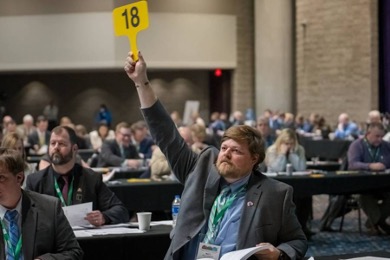New developments in the long-running battle over livestock markets may force the American Farm Bureau Federation to rethink its support for a bipartisan bill to bring transparency to those markets.
On Tuesday in Atlanta, delegates to the Farm Bureau’s annual meeting struggled with policy resolutions on the issue and ended up providing some potentially conflicting signals for policymakers.
They voted to maintain existing policy supporting a regional approach to resolving negotiated sales concerns in the livestock sector, but also voted to oppose government mandates that would force packing plants to buy a set amount of livestock on the cash market.

AFBF delegates debate in Atlanta. (AFBF)
Meanwhile Tuesday, Iowa GOP Sen. Chuck Grassley accused the Republican staff on the Senate Ag Committee of working with meatpackers to hurt his market reform bill. The staff is soliciting the views of economists on the legislation.
The packers have “great political power, and they also have the help of some of the staff on the Agriculture Committee,” Grassley told reporters.
What’s next: The National Cattlemen’s Beef Association will debate the issue later next month in Houston.
For more on the AFBF’s policy debate, read our weekly Agri-Pulse newsletter. We also report on what’s ahead for crop insurance this year.
EVs, waterways get Hill focus
The House Agriculture Committee holds a hearing today on electric vehicles while a Senate committee is expected to advance the nomination of Robert Califf to be commissioner of the Food and Drug Administration.
The EV hearing will feature testimony from representatives of General Motors and the Renewable Fuels Association, as well as car dealers, convenience stores and autoworkers.
The Senate Health, Education, Labor and Pensions Committee is expected to clear Califf’s nomination easily, but without the support of Vermont Independent Bernie Sanders, who has said the former commissioner is too close to the pharmaceutical industry.
Take note: Michael Connor, the Army’s assistant secretary for civil works, and Lt. Gen. Scott Spellmon, who commands the Army Corps of Engineers, are being questioned today in a pair of hearings about plans to spend the funding earmarked in the bipartisan infrastructure bill for waterways. 
New pesticide policy a step forward on long road
EPA’s newly announced policy to begin consulting with federal wildlife agencies on the impacts of new active ingredients on endangered species signals that the Biden administration is trying to resolve longstanding issues over Endangered Species Act compliance.
But EPA, the Fish and Wildlife Service and National Marine Fisheries Service still have a lot of work left in order to meet interagency consultation requirements for existing active ingredients, given the complexities of analyzing the impacts of crop protection chemicals on wildlife.
CropLife America CEO Chris Novak called the announcement "an important step forward" to protect endangered species and to ensure farmers "have needed tools for managing pests, and providing regulatory certainty for pesticide manufacturers and distributors.”
The Center for Biological Diversity says few conservation measures can be fully enacted until the USFWS and NMFS complete any formal consultations with EPA. CBD is a frequent litigant on ESA and pesticide issues.
The agency says it's working now on “a detailed work plan to outline additional improvements to further the agency’s compliance with the ESA, including steps to implement protections for high-risk species more efficiently, provide growers with more flexible mitigation measures, and increase stakeholder engagement.”
Organic industry leader solicits consumer pledges
Stonyfield Organic co-founder Gary Hirshberg is trying to enlist consumers and retailers in an effort to help a group of farms in the Northeast.
Under the unusual initiative being announced today, consumers will be asked to sign a pledge to buy at least one-fourth of their dairy products from among 35 brands, including Organic Valley and Stonyfield as well as smaller, local companies. Retailers are being asked to commit to carrying the target brands.
The goal is to find a new market for 135 farms that were notified recently that they are losing contracts with two companies by the end of 2023. Some 89 of the farms are being terminated by Horizon, a unit of Danone.
The Northeast Organic Family Farm Partnership bills itself as a first-of-its-kind collaboration.
Citrus claims strong year despite supply chain woes
After a year marked by substantial supply chain disruptions that resulted in shipments of fresh lemons rotting, revenues were exceptionally strong for the California company Limoneira, according to CEO Harold Edwards.
“Fourth quarter of fiscal year 2021 revenue, in our seasonally slower quarter, increased 13% compared to the same period last year,” Edwards said in an earnings report for the company that operates fruit farms in the U.S. and Chile. “These results were driven by higher lemon prices and very strong brokered fruit revenue which more than doubled compared to last year.”
Limoneira, a major lemon company and the largest U.S. avocado producer, expects lemon prices to continue strong through 2022.
FAS lowers Argentine soybean production forecast
Persistent drought conditions in Argentina mean the harvest this year is going to be smaller than expected, according to a new analysis from USDA’s Foreign Agricultural Service. A new estimate from the agency’s office in Buenos Aires now pegs production at 46.5 million metric tons, 3 million tons less than the latest forecast from USDA headquarters in Washington.
“Despite initial favorable conditions, Argentine oilseed crops have faced warm and dry weather across most growing regions since mid-December,” the FAS analysts said in the report. “Rains are needed soon to forestall more significant yield reductions.”
Argentina also is going to have trouble importing soybeans from Paraguay to make up the expected shortfall because of drought there, says FAS.
He said it. “Well, with all due respect to my friend from California, y’all are pretty screwed no matter what.” – Arizona Farm Bureau President Stefanie Smallhouse, joking with California Farm Bureau President Jamie Johansson during the Farm Bureau delegate process.
The delegates were debating the idea of requiring the approval of voters for land sales. Johansson had concerns about the expense of reaching voters in California.
Questions, comments, tips? Email philip@agri-pulse.com.





